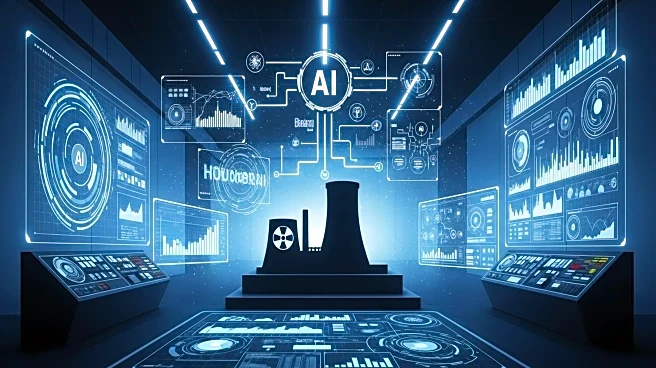What's Happening?
Vistra Energy is positioning itself as a key player in the AI-driven energy transition, with a significant focus on nuclear power. The company has seen a 48.5% surge in stock price in 2025, driven by its diversified energy portfolio that includes nuclear, natural gas, and renewables. Vistra's acquisition of Energy Harbor in 2023 expanded its nuclear capacity, aligning with the Biden administration's goal to increase U.S. nuclear capacity by 2050. The company has secured long-term power purchase agreements with major tech companies, ensuring stable revenue streams. However, critics warn that Vistra's reliance on nuclear energy could pose long-term risks due to the capital-intensive nature and uncertain future of nuclear projects.
Why It's Important?
Vistra's strategy highlights the growing importance of AI in transforming energy demand, particularly for data centers. The company's integrated model allows it to navigate market volatility better than pure-play energy producers. However, the reliance on nuclear energy raises concerns about cost overruns and regulatory challenges. As renewable energy alternatives become more cost-effective, Vistra's nuclear-centric approach may face increased scrutiny. The company's ability to balance its diversified portfolio against these risks will be crucial in maintaining its growth trajectory.
What's Next?
Vistra plans to invest $2.5 billion by 2027 in nuclear and storage projects, aiming to capitalize on the AI energy boom. The company is also deploying AI technology to optimize nuclear operations, potentially reducing costs. However, the long-term viability of its nuclear assets remains uncertain, especially if renewable technologies and grid innovations outpace nuclear development. Investors will need to weigh the potential benefits of Vistra's AI alignment against the structural challenges of the nuclear sector.
Beyond the Headlines
Vistra's strategic flexibility through acquisitions of natural gas plants provides a buffer against nuclear risks. The company's share buyback plan signals confidence in its capital allocation strategy. However, its exposure to nuclear energy ties it to regulatory uncertainties and public sentiment shifts. AI advancements may offer solutions to optimize nuclear operations, but the inherent challenges of scaling nuclear projects persist.









